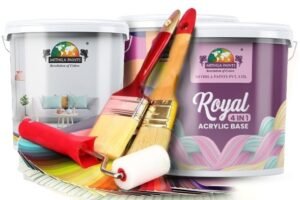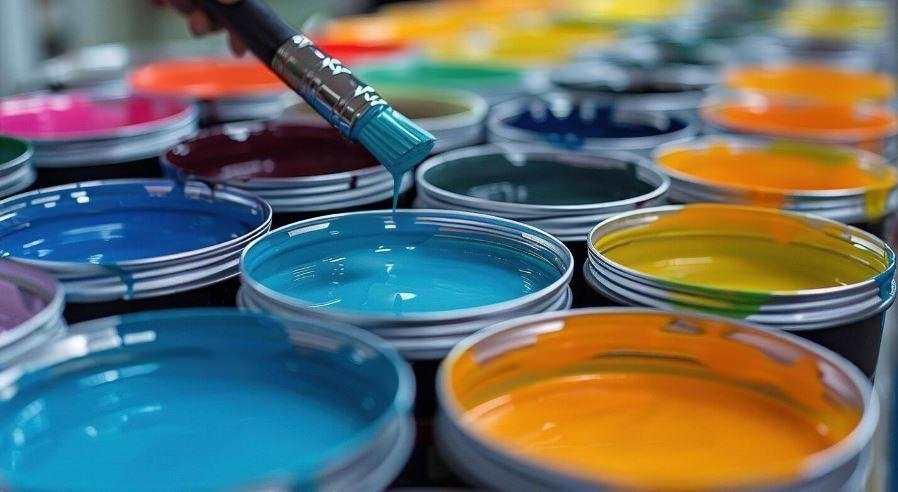Introduction to Recyclable Packaging
Mithila Paints stands as a notable entity in the paint industry, committed to merging quality artistry with environmentally responsible practices. Established with a strong focus on innovation, the company’s mission revolves around delivering superior paint products while minimizing environmental impact. Mithila Paints emphasizes sustainability in its operations, aligning with a growing demand for eco-friendly solutions within the market.
At the heart of Mithila Paints’ ethos lies the principle of stewardship toward nature. The company recognizes the significant challenges posed by traditional paint packaging, which often contributes to environmental degradation. As part of its core values, Mithila Paints actively prioritizes research and development to create products that not only meet the highest aesthetic and functional standards but also adhere to sustainable practices. This commitment is evident in its groundbreaking initiatives aimed at utilizing recyclable packaging, a pivotal step forward in reducing waste and conserving resources.
By embracing eco-conscious strategies, Mithila Paints highlights its role as a leader in the industry, fostering a culture of responsibility and awareness among its consumers. The company’s innovative approach extends beyond its paint formulations; it encompasses all aspects of its operations, including packaging and distribution designs. Through collaborative efforts with suppliers and partners, Mithila Paints strives to ensure that its recyclable packaging options become standard practice, effectively addressing the challenges of plastic waste in the paint sector.
The dedication of Mithila Paints to sustainability signifies a profound shift in the industry, where eco-friendly alternatives are being embraced with open arms. As the company progresses, it aims not only to captivate customers with high-quality products but also to inspire a broader movement towards responsible consumption and production in the paint industry.
The Importance of Sustainable Packaging
Sustainable packaging has emerged as a critical component in the conversation surrounding environmental conservation and waste management. Traditional packaging, often made from non-biodegradable materials, contributes significantly to landfill waste and pollutes our ecosystems. According to various studies, plastic products can take hundreds of years to decompose, resulting in an accumulation of waste that poses severe environmental threats. In light of this, companies are starting to recognize the importance of transitioning towards sustainable options.
Recyclable packaging serves not only as a solution to waste management issues but also reflects a company’s commitment to environmental responsibility. By adopting recyclable materials, organizations like Mithila Paints are actively reducing their ecological footprint. This move fosters a more circular economy, where materials are reused rather than discarded, helping to conserve natural resources and energy. Moreover, utilizing sustainable packaging can enhance a brand’s reputation, appealing to eco-conscious consumers who prefer products that align with their values.
Another significant aspect of sustainable packaging is its potential to mitigate pollution. Around the globe, pollution from conventional packaging has caused substantial harm to terrestrial and marine ecosystems. By opting for recyclable materials, businesses contribute to reducing the volume of waste that ends up in our oceans and landscapes. This conscious effort not only aids in combating climate change but also promotes biodiversity, which is essential for maintaining the health of our planet.
In summary, the transition to sustainable packaging is not merely an industry trend; rather, it is an essential practice that benefits both the environment and companies’ bottom lines. With growing awareness of climate and ecological crises, the significance of recyclable options, particularly in paint industries like Mithila Paints, will continue to rise, positioning them as leaders in sustainable practices.

Mithila’s Innovative Packaging Solutions
Mithila Paints has taken significant strides in developing innovative packaging solutions that prioritize both environmental sustainability and practical usability. Central to their strategy is the use of recyclable materials, which not only mitigate the environmental impact of waste but also enhance the overall consumer experience. By opting for materials such as post-consumer recycled plastics and biodegradable substances, Mithila Paints demonstrates a commitment to reducing reliance on virgin resources. This approach not only curtails greenhouse gas emissions but also conserves energy and natural resources associated with traditional packaging methods.
The design of Mithila’s packaging is another aspect where innovation thrives. The paint containers are engineered for easy handling and pouring, featuring ergonomic shapes that cater to a diverse range of users, from professional painters to DIY enthusiasts. This practicality is crucial in ensuring that consumers can manage their projects efficiently while minimizing mess and waste. Additionally, Mithila has incorporated clear labeling and instructional graphics directly onto their recyclable packaging, which serves to educate consumers about proper disposal and recycling practices. This information empowers users to make informed decisions that further bolster recycling efforts.
Moreover, Mithila Paints employs a careful balance between aesthetics and functionality in their packaging design. The vibrant colors and modern graphics not only attract customers but also resonate with contemporary design trends, enhancing the market appeal of their products. This creative approach ensures that consumers feel good about purchasing products that contribute positively to the environment without sacrificing style or usability. By integrating sustainability into packaging design, Mithila Paints is setting a benchmark within the industry that aligns consumer preference with ecological responsibility, fostering a culture of recycling and environmental stewardship.

Benefits of Using Recyclable Packaging
The integration of recyclable packaging within the paint industry, particularly at Mithila Paints, offers numerous advantages that contribute positively to environmental sustainability and business growth. One of the most significant benefits is the reduction of waste generated during the product lifecycle. By utilizing recyclable materials, Mithila Paints minimizes landfill contributions, which drastically lowers the environmental impact associated with paint consumption and disposal.
In addition to waste reduction, recyclable packaging is associated with lower carbon emissions. The materials used in recyclable packaging often require less energy to produce compared to their non-recyclable counterparts. This lower energy consumption contributes to a decrease in greenhouse gas emissions, helping to combat climate change. By adopting environmentally friendly packaging solutions, Mithila Paints not only aligns with global sustainability goals but also attracts environmentally conscious consumers who prioritize eco-friendly practices.
Another key aspect of recyclable packaging is its ability to enhance brand loyalty. As consumers become increasingly aware of the impact of their purchasing decisions, brands that prioritize sustainability can create a strong connection with their customers. Mithila Paints exemplifies this by showcasing its commitment to recyclable packaging, thereby fostering a sense of trust and loyalty among its consumers. Customers are often more inclined to support brands that demonstrate responsibility toward the environment, resulting in a robust customer base that is likely to remain loyal over time.
Furthermore, the implementation of recyclable packaging can contribute to improved brand image and market differentiation. As the paint industry evolves, companies that innovate and adopt sustainable practices, such as Mithila Paints, are positioned favorably in a competitive landscape. This can lead to increased sales and profitability, proving that environmentally responsible choices are beneficial not only for the planet but also for business success.
Consumer Perspective: Why Recyclable Packaging Matters
The modern consumer is increasingly aware of the environmental impact of their purchasing choices, leading to a significant shift in attitudes towards eco-friendly practices across various industries, including paint manufacturing. Recent surveys indicate that a substantial majority of consumers actively seek products that demonstrate sustainability, particularly in packaging. This growing demand emphasizes the importance of recyclable packaging in the paint industry.
The appeal of sustainable packaging extends beyond mere environmental concerns; it resonates with a desire for authenticity and corporate responsibility. Consumers feel more connected to brands that actively contribute to ecological preservation. Additionally, the education of consumers regarding the recyclability of materials has played a crucial role in fostering a preference for products with recyclable packaging. Brands like Mithila Paints that embrace this initiative not only cater to consumer demands but also build their reputations as pioneers in sustainable practices.
The connection between consumers and recyclable packaging is further strengthened as eco-conscious choices become embedded in consumer culture. Many individuals regard their purchases as extensions of their values, seeking to support businesses that align with their ecological beliefs. As Mithila Paints champions recyclable packaging, it acknowledges and caters to this evolving consumer mindset, positioning itself as a leader in the sustainable paint market.

Comparative Analysis with Competitors
Mithila Paints has established itself as a leader in the paint industry, particularly through its commitment to sustainable practices, including the use of recyclable packaging. This strategy not only aligns with global sustainability trends but also sets Mithila apart from its competitors. While many paint manufacturers have begun to explore eco-friendly alternatives, Mithila’s approach is comprehensive and deeply integrated into its overall business model.
Many leading brands in the paint sector are still relying heavily on traditional packaging materials, which contribute significantly to environmental waste. Companies like Brand A and Brand B have initiated limited programs to introduce recyclable options, yet these initiatives often lack the robust infrastructure for collection and recycling. In contrast, Mithila Paints has developed a well-rounded system that encompasses the entire lifecycle of its packaging, ensuring that recyclable materials are readily available and effectively disposed of by consumers through established partnerships with recycling centers.
Moreover, Mithila Paints proactively engages with its customer base to heighten awareness about the importance of sustainability in the paint industry. Through educational marketing campaigns, customers are encouraged to return used packaging for recycling or participate in community initiatives aimed at reducing waste. This community engagement amplifies Mithila’s brand loyalty and positions it as a pioneer in promoting responsible consumption.
Additionally, the quality of Mithila’s recyclable packaging is designed to protect the integrity of the paint while minimizing environmental impact. While some competitors may prioritize cost-cutting measures, resulting in less durable packaging options, Mithila emphasizes both performance and sustainability. This dual focus not only reflects the growing market demand for eco-conscious products but also establishes Mithila Paints as a model for other companies striving to innovate in sustainability.
Challenges in Implementing Recyclable Packaging
The transition to recyclable packaging within the paint industry offers notable environmental benefits, but it is not without its challenges, particularly for companies like Mithila Paints. One of the primary hurdles in implementing recyclable packaging involves sourcing suitable materials that meet both sustainability standards and performance requirements. Finding suppliers who can consistently provide sustainable, high-quality materials at scale can be difficult. This challenge is compounded by existing relationships with traditional packaging suppliers, which can create additional complexity in the supply chain.
Economic considerations also play a critical role in the transition to recyclable packaging. The initial investment in research and development for packaging innovations can be substantial. Companies may encounter higher costs in the short term associated with the production of recyclable materials compared to conventional options. Additionally, scaling up production to meet demand for recyclable packaging necessitates further investments in equipment upgrades and employee training. These financial implications pose significant challenges, particularly for small to medium-sized enterprises.
Consumer education represents another key challenge in implementing recyclable packaging. While many consumers express a preference for environmentally friendly products, there remains a knowledge gap concerning proper recycling practices. Mithila Paints must invest in consumer outreach and educational campaigns that inform customers on how to recycle packaging effectively. By fostering consumer engagement, the company can promote responsible disposal, ensuring that recyclable materials are returned to the manufacturing stream rather than ending up in landfills. This dual focus on logistical and educational challenges is imperative for a successful transition to sustainable practices in packaging.
Future Innovations in Sustainable Packaging
The paint industry is undergoing a transformative shift towards sustainability, particularly in the realm of packaging. Mithila Paints is at the forefront of this movement, exploring innovative recyclable packaging solutions that not only reduce environmental impact but also resonate with the values of environmentally conscious consumers. Looking ahead, several trends and technologies appear poised to shape the future of sustainable packaging.
One notable direction is the potential integration of smart packaging technologies. Such innovations may include QR codes or augmented reality components that engage customers and provide information on the recyclability process. This interactivity not only boosts consumer awareness about sustainable practices but also fosters a deeper connection between the brand and its audience. By providing customers with relevant and actionable information, Mithila Paints can promote responsible disposal and recycling habits.
Another exciting prospect is the development of bio-based or compostable materials as alternatives to conventional plastics. These advancements could revolutionize paint packaging, significantly reducing reliance on fossil fuels. Research is ongoing into biodegradable polymers derived from natural sources, which could offer a viable solution without compromising on packaging performance. By adopting such materials, Mithila Paints could position itself as a leader in the sustainable packaging arena.
Collaboration across the supply chain will also be critical in driving innovation. Partnerships with material scientists, recycling firms, and industry stakeholders can catalyze the creation of streamlined, recyclable packaging solutions that are both functional and eco-friendly. Through collective effort, Mithila Paints can set a benchmark for sustainability standards in the paint industry, reinforcing its commitment to environmental stewardship.
As the paint industry moves forward, embracing these innovations in sustainable packaging will not only enhance brand loyalty but also contribute to a greener future, enabling Mithila Paints to lead by example in the quest for environmental responsibility.
Conclusion: Mithila Paints Leading by Example
In reviewing the significant advancements made in the paint industry, it is clear that Mithila Paints stands at the forefront of sustainable practices, particularly with its commitment to using recyclable packaging. This initiative not only showcases the company’s dedication to environmental stewardship but also serves as a crucial model for others in the industry. By prioritizing recyclable materials, Mithila Paints exemplifies how businesses can incorporate eco-friendly solutions while maintaining product quality and customer satisfaction.
The emphasis on recyclable packaging in Mithila Paints’ operations highlights an essential shift toward sustainability in the paint sector. Such measures help reduce landfill waste, lower carbon footprints, and promote a circular economy, where materials are reused and repurposed rather than discarded. These efforts resonate with the growing consumer demand for eco-conscious products, as more individuals are making purchasing decisions based on a company’s environmental impact.
Furthermore, the proactive approach taken by Mithila Paints in embracing recycled packaging encourages other companies to re-evaluate their own practices. By setting clear examples and leading substantive initiatives, Mithila Paints is not just improving its brand image but also cultivating an industry-wide movement towards sustainable practices. The direct impact of such encouragement can spur innovation, ultimately benefiting both the environment and the economy.
As the paint industry continues to evolve, it is crucial for consumers to recognize the importance of supporting companies like Mithila Paints that prioritize recycled materials. Making informed choices allows consumers to participate in the larger goal of fostering environmental responsibility. In conclusion, Mithila Paints serves as a beacon of leadership, providing an insightful framework for how sustainability can be effectively integrated within the paint industry and inspiring further progress across various sectors.


